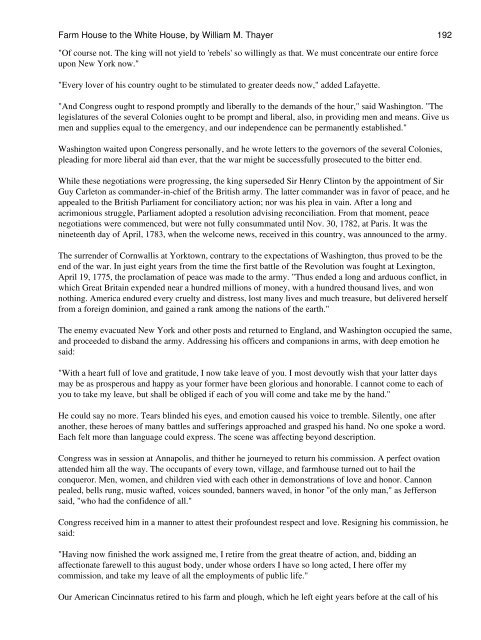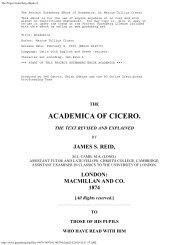From Farm House to the White House - 912 Freedom Library
From Farm House to the White House - 912 Freedom Library
From Farm House to the White House - 912 Freedom Library
You also want an ePaper? Increase the reach of your titles
YUMPU automatically turns print PDFs into web optimized ePapers that Google loves.
<strong>Farm</strong> <strong>House</strong> <strong>to</strong> <strong>the</strong> <strong>White</strong> <strong>House</strong>, by William M. Thayer 192<br />
"Of course not. The king will not yield <strong>to</strong> 'rebels' so willingly as that. We must concentrate our entire force<br />
upon New York now."<br />
"Every lover of his country ought <strong>to</strong> be stimulated <strong>to</strong> greater deeds now," added Lafayette.<br />
"And Congress ought <strong>to</strong> respond promptly and liberally <strong>to</strong> <strong>the</strong> demands of <strong>the</strong> hour," said Washing<strong>to</strong>n. "The<br />
legislatures of <strong>the</strong> several Colonies ought <strong>to</strong> be prompt and liberal, also, in providing men and means. Give us<br />
men and supplies equal <strong>to</strong> <strong>the</strong> emergency, and our independence can be permanently established."<br />
Washing<strong>to</strong>n waited upon Congress personally, and he wrote letters <strong>to</strong> <strong>the</strong> governors of <strong>the</strong> several Colonies,<br />
pleading for more liberal aid than ever, that <strong>the</strong> war might be successfully prosecuted <strong>to</strong> <strong>the</strong> bitter end.<br />
While <strong>the</strong>se negotiations were progressing, <strong>the</strong> king superseded Sir Henry Clin<strong>to</strong>n by <strong>the</strong> appointment of Sir<br />
Guy Carle<strong>to</strong>n as commander-in-chief of <strong>the</strong> British army. The latter commander was in favor of peace, and he<br />
appealed <strong>to</strong> <strong>the</strong> British Parliament for concilia<strong>to</strong>ry action; nor was his plea in vain. After a long and<br />
acrimonious struggle, Parliament adopted a resolution advising reconciliation. <strong>From</strong> that moment, peace<br />
negotiations were commenced, but were not fully consummated until Nov. 30, 1782, at Paris. It was <strong>the</strong><br />
nineteenth day of April, 1783, when <strong>the</strong> welcome news, received in this country, was announced <strong>to</strong> <strong>the</strong> army.<br />
The surrender of Cornwallis at York<strong>to</strong>wn, contrary <strong>to</strong> <strong>the</strong> expectations of Washing<strong>to</strong>n, thus proved <strong>to</strong> be <strong>the</strong><br />
end of <strong>the</strong> war. In just eight years from <strong>the</strong> time <strong>the</strong> first battle of <strong>the</strong> Revolution was fought at Lexing<strong>to</strong>n,<br />
April 19, 1775, <strong>the</strong> proclamation of peace was made <strong>to</strong> <strong>the</strong> army. "Thus ended a long and arduous conflict, in<br />
which Great Britain expended near a hundred millions of money, with a hundred thousand lives, and won<br />
nothing. America endured every cruelty and distress, lost many lives and much treasure, but delivered herself<br />
from a foreign dominion, and gained a rank among <strong>the</strong> nations of <strong>the</strong> earth."<br />
The enemy evacuated New York and o<strong>the</strong>r posts and returned <strong>to</strong> England, and Washing<strong>to</strong>n occupied <strong>the</strong> same,<br />
and proceeded <strong>to</strong> disband <strong>the</strong> army. Addressing his officers and companions in arms, with deep emotion he<br />
said:<br />
"With a heart full of love and gratitude, I now take leave of you. I most devoutly wish that your latter days<br />
may be as prosperous and happy as your former have been glorious and honorable. I cannot come <strong>to</strong> each of<br />
you <strong>to</strong> take my leave, but shall be obliged if each of you will come and take me by <strong>the</strong> hand."<br />
He could say no more. Tears blinded his eyes, and emotion caused his voice <strong>to</strong> tremble. Silently, one after<br />
ano<strong>the</strong>r, <strong>the</strong>se heroes of many battles and sufferings approached and grasped his hand. No one spoke a word.<br />
Each felt more than language could express. The scene was affecting beyond description.<br />
Congress was in session at Annapolis, and thi<strong>the</strong>r he journeyed <strong>to</strong> return his commission. A perfect ovation<br />
attended him all <strong>the</strong> way. The occupants of every <strong>to</strong>wn, village, and farmhouse turned out <strong>to</strong> hail <strong>the</strong><br />
conqueror. Men, women, and children vied with each o<strong>the</strong>r in demonstrations of love and honor. Cannon<br />
pealed, bells rung, music wafted, voices sounded, banners waved, in honor "of <strong>the</strong> only man," as Jefferson<br />
said, "who had <strong>the</strong> confidence of all."<br />
Congress received him in a manner <strong>to</strong> attest <strong>the</strong>ir profoundest respect and love. Resigning his commission, he<br />
said:<br />
"Having now finished <strong>the</strong> work assigned me, I retire from <strong>the</strong> great <strong>the</strong>atre of action, and, bidding an<br />
affectionate farewell <strong>to</strong> this august body, under whose orders I have so long acted, I here offer my<br />
commission, and take my leave of all <strong>the</strong> employments of public life."<br />
Our American Cincinnatus retired <strong>to</strong> his farm and plough, which he left eight years before at <strong>the</strong> call of his















